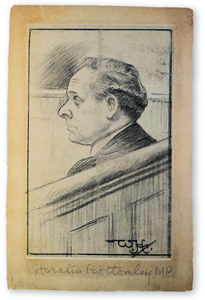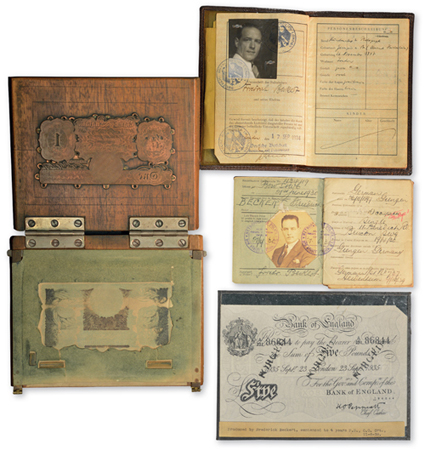
WILLIAM HARTLEY (1862–1937) was a journalist who composed courtroom sketches of the characters involved in many trials from 1893 to 1919, and whose original drawings are part of the Crime Museum’s collection. One of his subjects was Horatio Bottomley who had entered Parliament in 1906 as Liberal member for Hackney South. A year later, Bottomley launched John Bull, a patriotic journal. He also started the John Bull Victory Bond Club, a forerunner of premium bonds, and had a notable talent for persuading people to spend money on the bonds. A mixture of fraud and mismanagement resulted in the collapse of the scheme, his conviction for fraud, a sentence of seven years’ imprisonment and expulsion from Parliament. Bottomley is one of a number of politicians who have appeared in the courts.
Jabez Balfour (1843–1916) was the Liberal MP for Tamworth from 1880 to 1885 and for Burnley from 1889 to 1893. He had been Mayor of Croydon, and, in 1887, was involved in setting up an investment underwriting firm with two City of London financiers. He was involved in a series of companies that largely traded with each other, but he did in fact construct some substantial buildings in London. In 1892 he was engulfed in scandal involving the Liberator Building Society, then the largest in the country, whose members were often Nonconformist church members, perhaps influenced by Balfour’s ostensible position as a pillar of the Congregational church. Instead of advancing money to large numbers of prospective house purchasers using their homes as security, the Liberator Building Society bought property already owned by Balfour at inflated prices. When Balfour’s companies failed, they owed about £7 million. Balfour fled the country to Argentina and was arrested there in 1895 by Detective Inspector Frank Froest. Froest was a strong and determined man, who could tear up a pack of playing cards with his hands. He became impatient with what seemed interminable extradition wrangling and bundled Balfour on to a train, then a ship bound for London. Balfour was convicted at the Old Bailey and sentenced to fourteen years’ penal servitude, notwithstanding the breach of extradition procedures.

c. 1912
Horatio Bottomley, possibly in court here for bankruptcy proceedings
Maundy Gregory (1877–1941) was a British theatre producer and political fixer who acted as a broker to sell political honours, with prices ranging from £10,000 for a knighthood to £40,000 for a baronetcy, on behalf of Lloyd George. In 1933, Gregory was the first person to be convicted under the Honours (Prevention of Abuses) Act 1925, which made it illegal to agree to give or accept any gift, money or valuable consideration in any connection with the grant of any honour. He was fined £50 and jailed for two months. There were claims that Gregory continued to offer various honours for sale when he no longer had influence to implement his promises, but he was protected from legal action by the fact that his victims could not complain for fear of also being prosecuted under the 1925 Act.
Tony Blair was Labour prime minister from 1997 to 2007 and at one stage became embroiled in an investigation conducted by Assistant Commissioner John Yates. The police inquiry had been initiated by a complaint from members of the Scottish National Party and others that £14 million in loans given by wealthy individuals to the Labour Party during the 2005 General Election campaign were made in breach of the 1925 Act after some donors were subsequently recommended for life peerages. The prime minister was interviewed three times but was not cautioned, a procedure that would have been necessary for his answers to be made admissible in any prosecution against him. Lord Levy, a fund raiser for the Labour Party, was arrested and twice interviewed under caution, along with other staff who worked for No. 10 Downing Street, but the Director of Public Prosecutions decided against legal action in July 2007. The case was relevant both for the way in which political parties were funded and also for the process by which prominent people in public life who also contributed to political parties could justifiably be recognised through the honours system.
Reginald Maudling (1917–79) resigned as Home Secretary for the Conservative Party in 1972 when the Metropolitan Police commenced fraud investigations against John Poulson, a bankrupted property developer and architect whom Maudling had assisted to win contracts. As Home Secretary, he acted as police authority for the Metropolitan Police under arrangements in force at that time and resigned to ensure that there were no conflicts of interest. He was not prosecuted.
An opposition Labour MP, John Stonehouse (1925–88) set up a number of business interests, but, concerned about an investigation by the Department of Trade and Industry, faked his own death by leaving his clothes on a Miami beach on 20 November 1974. He then went to Australia where he adopted the false identity of Joseph Markham, the dead husband of a constituent, and lived there with his parliamentary secretary, Sheila Buckley. ‘Markham’ was arrested in Melbourne, on Christmas Eve 1974, by Australian officers who first supposed he was Lord Lucan. Eventually, he was extradited, convicted and sentenced to seven years’ imprisonment for fraud. He continued to act as an MP whilst in prison, but finally gave up the Labour whip in April 1976, resigning as an MP on 28 August 1976.
In 2009, The Daily Telegraph published details of expenses claimed by MPs that had previously been confidential. Many of the problems arose from MPs needing to live both in London and in their constituencies, and from how the inevitable expenses relating to these second homes were dealt with. There was widespread connivance in an expenses system that had been interpreted as compensating for salaries seen as insufficient. A panel headed by former civil servant Sir Thomas Legg reviewed the expenses and referred a small minority of cases to the police where the claims for expenses amounted to criminal conduct rather than breaches of parliamentary rules about allowances. Members of Parliament were held not to be protected from prosecution in relation to these financial, rather than political, issues.
Elliot Morley MP pleaded guilty to two cases of false accounting to the value of £30,000 relating to payments for a mortgage that had been repaid, and was sentenced to sixteen months’ imprisonment. David Chaytor MP pleaded guilty and was sentenced to eighteen months on three counts of false accounting amounting to about £18,000 for instalments on a mortgage that had already been redeemed, and claiming rent for a flat he owned. Jim Devine MP was convicted of false accounting relating to an invoice for work on his home from a non-existent company and was sentenced to sixteen months. Lord Hanningfield was jailed for expenses relating to overnight stays in London when he had, in fact, returned to his home in Essex, and was jailed for nine months. Lord Taylor was convicted of wrongful claims relating to travel costs and overnight London accommodation by wrongly using an address in Oxford as his base, and was sentenced to twelve months. In December 2012, Margaret Moran, by then no longer the MP for Luton South, was sentenced for claims relating to her partner’s house in Southampton, and received a two-year supervision and treatment order because of illness. Denis MacShane received six months’ imprisonment for claims based on false invoices worth £12,900.
These cases provide examples of how police officers are sometimes called to investigate and deal with offenders regardless of their position in life, and how the system in Britain can enable the law to apply to all, regardless of status.

1937
Frederick Beckert’s identity documents and forgery items